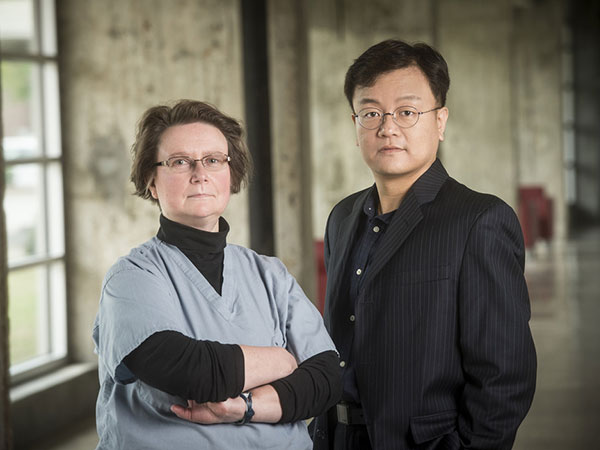$2 Million Grant Seeks to Improve Care of Patients with Kidney Disease
A company cofounded by biomedical engineering professor Ho Wook Jun, Ph.D., is teaming up with UAB physicians and researchers to improve care for patients with end-stage kidney disease, thanks to a $2-million grant from the National institutes of Health.
 UAB cardiologist Brigitta Brott and BME professor Ho-Wook Jun.Today, more than 600,000 people in the U.S. are living with end-stage kidney disease, and more than 80 percent of the affected patients use hemodialysis as their renal replacement modality of choice. The Achilles’ heel in the care of dialysis patients is the development of a functioning and durable vascular access, preferably an arteriovenous fistula (AVF), which is a surgically created connection from an artery to a vein that removes and returns blood from the patient’s arm. This acts as the transport system during the dialysis process of cleaning toxins out of the blood and passing the blood through an artificial kidney.
UAB cardiologist Brigitta Brott and BME professor Ho-Wook Jun.Today, more than 600,000 people in the U.S. are living with end-stage kidney disease, and more than 80 percent of the affected patients use hemodialysis as their renal replacement modality of choice. The Achilles’ heel in the care of dialysis patients is the development of a functioning and durable vascular access, preferably an arteriovenous fistula (AVF), which is a surgically created connection from an artery to a vein that removes and returns blood from the patient’s arm. This acts as the transport system during the dialysis process of cleaning toxins out of the blood and passing the blood through an artificial kidney.
Jun’s company, Endomimetics, has collaborated on development of an AVF. “When you need dialysis, you have to have a needle put in three times a week to get the fluid exchanged,” said Brigitta Brott, M.D., UAB cardiologist and professor of medicine, and co-founder of Endomimetics. “The best way to do that is to have a direct connection between the artery and vein.”
“AVFs are the current gold standard of care for patients of dialysis,” said Timmy Lee, M.D., professor in UAB’s Division of Nephrology. “Unfortunately, that gold standard of care is not perfect — most AVFs never develop successfully to be used for dialysis treatment.”
Patients who have AVFs that fail are faced with months of time before they are able to receive another AVF, which means they must receive dialysis with a catheter, which carries a host of its own issues.